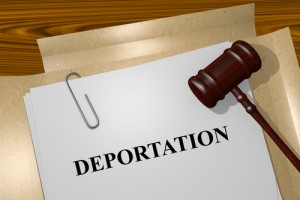New York program provides public defenders in deportation cases

When Judge Robert Katzmann joined the 2nd U.S. Circuit Court of Appeals at New York City in 1999, immigration was a “minuscule” part of the docket. Six years later, it had become 40 percent of the caseload.
Not only did the court have a hard time keeping up, but those facing deportation faced a severe disadvantage: There’s no right to appointed counsel for the poor in immigration cases because deportation is a civil, not criminal, penalty. In the cases that trickled up to the 2nd Circuit, Katzmann saw the results.
“I was able to see, in case after case, the carnage that results when families and individuals don’t have adequate counsel,” Katzmann said as part of a panel, “No Deportation Without Representation,” at the ABA’s 2014 annual meeting in Boston. “I always had a sense that ... if there had been a good lawyer, then the outcome might have been different, the family might not have been torn asunder.”
So Katzmann convened a group to study the issue and started a small revolution in immigration law by forming the New York Immigrant Family Unity Project. It’s the nation’s first program offering universal representation to detained immigrants, accepting everyone who meets income criteria. Publicly funded by New York City, the project essentially imports public defenders into immigration courts.
The project has made a dramatic difference to detained immigrant New Yorkers. The Vera Institute of Justice says attorneys have reunited more than half of their clients with their families. It’s been so successful that the project has expanded to two upstate New York immigration courts, and is being used as a model for similar programs planned in Boston, Chicago, Los Angeles and San Francisco.
For immigrant legal services groups, which can generally take only a fraction of viable removal cases, the New York project represents a breakthrough, according to Andrea Saenz, who was a core advocate for the program as a teaching fellow at the Benjamin N. Cardozo School of Law.
“Previously, we have always had to use a patchwork of resources to get people facing deportation counsel,” says Saenz, who’s now a supervising attorney at Brooklyn Defender Services. “It’s the first time that we’ve been able to get any government entity to put up the funds ... so that they can have a fair fight.”
HIGH STAKES
Deportation is not a criminal matter, yet the immigration enforcement system shares many of the features of the criminal system: arrests by uniformed officers, jail or bail pending trial, and attorneys from the Department of Homeland Security who act as a kind of prosecutor. And because deported immigrants can lose their jobs, families and homes, the stakes in immigration court are even higher than they are in some criminal cases.
“We put people in a situation, especially when they’re detained, where they’re locked up and facing deportation and have to defend themselves in an ... unbelievably hard and complex” setting, Saenz says. “The government has a lawyer and they don’t, and they may have no English skills or no education, and what that results in is people getting deported who shouldn’t.”
While there are some publicly funded lawyers available to represent immigrants, most who can’t afford one must find pro bono representation or go without. Indeed, federal statistics show that 42 percent of people in immigration court in fiscal year 2015 had no lawyer at any point in their cases. Success rates for self-represented immigrants are dismal. Katzmann’s New York study group found that just 13 percent of unrepresented New Yorkers who weren’t detained and 3 percent of those who were detained won their cases.
The group also found that whether immigrants were detained—jailed pending a removal trial—made a dramatic difference in their cases. Even with an attorney, only 18 percent of detained New Yorkers won their cases. When immigrants had both an attorney and were not in detention, 74 percent won their cases.
That’s why the New York Immigrant Family Unity Project focuses its efforts on detained New York immigrants. In its second phase, the study group determined that representing detained people—those who have the least ability to gather evidence and find their own attorneys—should be its priority. It launched a pilot project to do that in late 2013.
The project was successful enough that in the next two years New York granted it enough funding to represent every immigrant detained at the city’s Varick Street detention center, as well as New Yorkers with cases in New Jersey. Existing legal services providers—currently the Bronx Defenders, Brooklyn Defender Services and the Legal Aid Society—supply the attorneys.
The results have been striking: As of December, project attorneys had won 69 percent of their cases in New York, and Vera expects that the project will increase the proportion of detained immigrants permitted to stay in the United States by 1,000 percent. It’s also won a precedent at the 2nd Circuit, saying immigrants subject to mandatory detention must have a bond hearing within six months of detention.
In addition, project organizers have successfully pushed for state funding, permitting the effort to spread upstate and provide limited representation in immigration courts at Batavia and Ulster. Organizers are working toward funding to represent everybody in those two courts, plus the state’s other two upstate immi-gration courts serving detained immigrants in Bedford Hills and Fishkill.
HOLISTIC DEFENSE
The rest of the country has taken notice. Vera says organizers in several other jurisdictions have been in touch for advice on launching their own versions of the program.
These projects are in early planning stages, but at least two other projects doing similar work have already launched. One is in Alameda County, California—the eastern Bay Area County that includes Berkeley, where “crimmigration” attorney Raha Jorjani approached Public Defender Brendon Woods with the idea.
“I pointed out that New York City had been conducting a similar model with great success and there’s no reason why California, with its significant immigrant population, shouldn’t be making the same efforts,” says Jorjani, formerly a supervising attorney at the University of California at Davis’ Immigration Law Clinic.
Woods agreed—and hired Jorjani as California’s first full-time county public defender for immigration matters. Jorjani takes a limited number of immigration cases—generally deportation cases or those of undoc-umented juveniles who are eligible for legal status because they’ve been abused or abandoned by a parent. Within its first three years, the program won 12 of its 15 completed cases and a published ruling from a California appeals court.
It’s also started a trend in other Bay Area public defender offices. San Francisco has hired its own specialist, Francisco Ugarte, to do a job similar to Jorjani’s. And the counties of Contra Costa, Santa Clara and Sonoma have hired specialists of their own to do immigration consulting in criminal cases and limited nonremoval work.
Meanwhile, in New Jersey, the New York project has also inspired an entirely private effort. The American Friends Service Committee, a nonprofit that puts the Quaker faith into action, launched the Friends Representation Initiative of New Jersey in March of 2015. It uses its own in-house lawyers and grant funding to represent detained clients before the court at the Elizabeth, New Jersey, detention center. Amy Gottlieb, who oversees the program in her role as associate regional director at the AFSC, participated in the later stages of Katzmann’s study group.
The project doesn’t have the capacity to represent everybody detained at Elizabeth. Nonetheless, the AFSC estimates that on the days it’s in court, it represents 95 to 100 percent of immigrants whose cases are heard that day—a vast improvement over the estimated 35 percent representation rate before her group arrived.
Gottlieb, an attorney herself, says other programs and private counsel represent almost everyone else who’s detained at Elizabeth, creating a vital safety net.
It’s “desperately important for people to realize that immigration lawyers make a difference,” Gottlieb says. “Any program that increases access to counsel in any way ... makes a difference in what often can be a question of life or death.”
This article originally appeared in the September 2016 issue of the ABA Journal with this headline: “Immigrant Advocates: An innovative program in New York provides public defenders in deportation cases.”



